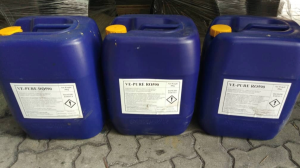
Water treatment is a critical process that guarantees the safety and purity of our water supply for various applications. In this context, antiscalants emerge as indispensable tools for maintaining water purification system efficiency and warding off the adverse effects of scale formation. In this blog post, we’ll delve into the significance of antiscalants in water treatment, their operational mechanism, practical applications and their pivotal role in preserving the functionality of water treatment systems.
Understanding the Challenge: Scale Formation
Scale formation poses a recurring challenge in water treatment processes, particularly in areas with hard water. Hard water contains elevated concentrations of minerals, predominantly calcium and magnesium ions, which have a tendency to precipitate and form scale deposits when subjected to heat or concentration. These scale deposits can wreak havoc on equipment and pipelines, causing diminished efficiency and a shorter lifespan.
The Role of Antiscalants
Antiscalants, as their name implies, are chemical compounds meticulously designed to thwart scale formation within water treatment systems. They serve as a proactive defense mechanism against the detrimental consequences of scale accumulation. Here’s how antiscalants operate:
- Crystal Growth Inhibition:Antiscalants work by disrupting the crystallization process of minerals that form scale. They interfere with the formation of solid crystal structures, preventing them from adhering to surfaces and forming scale deposits.
- Threshold Inhibition:Antiscalants function by establishing a threshold concentration of inhibitors in the water. Once this threshold is surpassed, it impedes the precipitation of scale-forming ions, keeping them suspended in the water.
Applications of Antiscalants
Antiscalants find application across various industries and processes where scale formation can pose significant problems:
- Industrial Boilers:In industrial settings, boilers often fall prey to scale buildup due to the high-temperature conditions they operate in. Antiscalants are pivotal in preserving boiler efficiency by averting scale accumulation on heating surfaces.
- Reverse Osmosis (RO) Systems:RO membranes are susceptible to scaling, which can compromise filtration efficiency. Antiscalants are deployed to shield RO membranes from scale formation, thereby ensuring the purity of treated water.
- Cooling Towers:Cooling towers employed in HVAC systems and industrial cooling processes are prone to scale deposits. Antiscalants play a crucial role in sustaining heat transfer efficiency and prolonging equipment longevity.
- Desalination Plants:Desalination, the process of extracting salt and minerals from seawater or brackish water, is heavily reliant on antiscalants. They are indispensable in preventing scale formation on the membranes used in desalination processes.
- Oil and Gas Production:Water is often used in various capacities in oil and gas extraction and processing. Antiscalants are instrumental in safeguarding equipment from scale deposits, thereby ensuring smooth operations.
Benefits of Antiscalants
The incorporation of antiscalants into water treatment confers several noteworthy advantages:
- Enhanced Efficiency:Antiscalants contribute to sustained water treatment equipment efficiency, resulting in reduced energy consumption and operational costs.
- Extended Equipment Lifespan:By preventing scale buildup, antiscalants help prolong the life of equipment and pipelines, consequently reducing maintenance and replacement expenses.
- Water Quality Assurance:Antiscalants play a pivotal role in upholding the quality of treated water, rendering it suitable for consumption and diverse industrial applications.
- Environmental Considerations:Antiscalants can diminish the environmental footprint of water treatment procedures by optimizing resource utilization.
Selecting the Right Antiscalant
Choosing the appropriate antiscalant is paramount for the success of a water treatment system. Factors to contemplate include:
- Water Composition:The mineral content and pH of the water source influence antiscalant selection. Specific antiscalants are tailored for distinct water chemistries.
- System Conditions:Operational temperature, pressure, and flow rates should all be considered when determining the ideal antiscalant.
- Compatibility:Antiscalants must be compatible with other chemicals and treatment processes implemented within the system.
- Dosage Control:Effective dosage control mechanisms must be in place to ensure precise antiscalant administration within the system.
Challenges and Considerations
While antiscalants deliver significant benefits, several challenges and considerations must be taken into account:
- Chemical Handling:The proper handling and storage of antiscalants are imperative to prevent accidents and ensure the safety of personnel.
- Monitoring and Control:Regular monitoring of water quality and antiscalant dosage is essential to maintain the treatment’s effectiveness.
- Regulatory Compliance:Water treatment facilities must adhere to regulations governing the use of antiscalants and other chemicals.
Conclusion: Antiscalants play a pivotal role in contemporary water treatment, safeguarding the efficiency and integrity of treatment systems while ensuring the purity of the treated water. Their ability to inhibit scale formation is invaluable across industries ranging from power generation to food and beverage production. As technology advances, the development of more efficient and environmentally friendly antiscalants continues, further enhancing the sustainability of water treatment processes. By comprehending the significance of antiscalants and their correct application, we can continue to enjoy safe and clean water for diverse purposes while minimizing our environmental impact.

